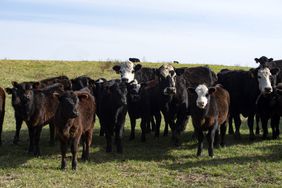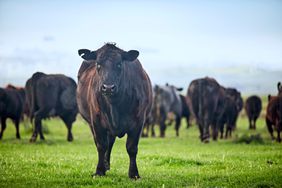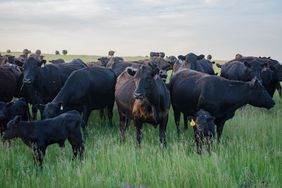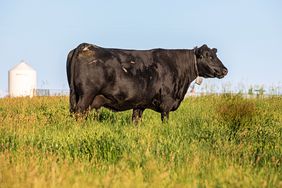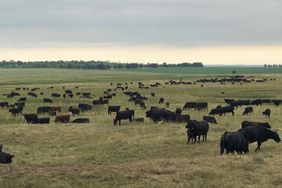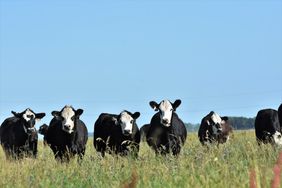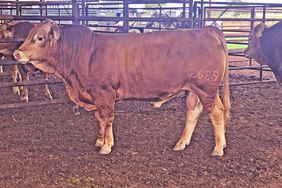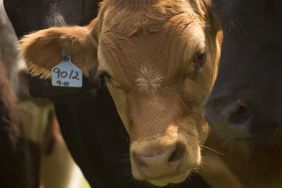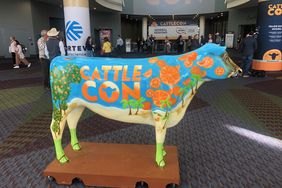:max_bytes(150000):strip_icc()/red20steer_0-1-89a8a4309ff048ef957ed07de31f3e48.jpeg)
- READ MORE: Budding farmer aims to normalize hemp
Farmers are prohibited from feeding animals hempseed cake since the legal limits of cannabinoids CBD and THC in processed meat was unknown and not regulated by the Food and Drug Administration (FDA).
However, new research from USDA's Agricultural Research Service is a significant step toward hemp cake becoming approved by the FDA. The research discovered that processed meat from cattle-fed hempseed cake does have low residues of cannabis chemicals in cattle muscles, livers, kidneys, and fat tissue.
"The USDA's study is essential in showing the safety of hempseeds in cattle diets and provides data on the safety of that beef entering the supply chain," says Michael Kleinhenz, professor of beef production medicine at Kansas State University.
:max_bytes(150000):strip_icc()/USDAHempSeedCake-1-b00e0f6e87e64e86ab06b036079fc222.png)
- READ MORE: 15 minutes with hemp farmer, Leigh Barry
Last year, Kleinhenz did a study that showed feeding cattle hempseed cake — and containing cannabinoids — has a beneficial effect on cattle welfare by reducing the stress hormone cortisol and increasing times when cattle lie down.
"Our research found that it would be challenging for a human to consume enough fat from cattle fed with hempseed cake to exceed any regulatory guidelines for dietary THC exposure," says David Smith, senior researcher with the USDA's Animal Metabolism-Agricultural Chemicals Research Unit in Fargo, North Dakota.
"This is a minimal amount that should not pose a safety issue for consumers, but there are no established thresholds or standards for cannabinoids in animal feeds in the United States or the Europe Union," says Kleinhenz.
The lack of a regulatory threshold has been a significant barrier to the approval of hempseed cake in animal feed.
"Hemp seeds are generally considered safe, but hempseed cake has yet to be approved for livestock diets," he adds.
Is hemp-fed beef safe to feed and eat?
Many studies find hempseed cake highly nutritious and could be a viable alternative feed source for cattle. Hempseed cake is high in protein and fat content. Another benefit from the research: hempseed cake makes cattle lie down more, which helps them produce saliva to aid rumination.
For three months, Smith and his team observed groups of heifers fed a ration containing 20% hempseed cake with an average concentration of cannabinoids (CBD and THC), that was less than the 0.3% THC threshold for CBD oil.
Most of the time, cannabinoid residues were in the urine or plasma of cattle during the feeding period. However, scientists also looked at the CBD and THC levels measured in adipose tissue (fat) of the cattle harvested at zero, one, four, and eight days after they removed hempseed cake from the diet with no withdrawal period.
The levels of CBD and THC from the hempseed cake were almost undetectable in the liver, kidney, and skeletal muscle.
- READ MORE: Tips from a Minnesota farmer on growing hemp
"From a food safety viewpoint, with a low cannabinoid content, hempseed cake could be a suitable source of crude protein and fiber in cattle. It could offer a potential market for industrial hemp producers for their byproduct from hempseed oil extraction," says Smith.
"Hemp cake would be a suitable alternative to soybean meal and other protein sources," adds Kleinhenz. "Farmers could incorporate hemp cake into cattle diets like any feed ingredient, if approved."
What is the next step?
USDA and FDA must establish a threshold for cannabinoid inclusion, and safety is the next hurdle for hempseed cake in cattle diets. That will take some time as more research could be needed before it can be approved, says Kleinhenz.
The Hemp Feed Coalition is also leading research to gain approval in feeding hemp cake to laying hens in the United States, such as the Chiques Creek egg brand from Kreider Farms, an egg and dairy producer based in Lancaster County, Pennsylvania. Two years ago, the brand launched its hemp-fed, cage-free eggs.
Hemp's progression in agriculture
Products from cannabis plants, also known as hemp, have been used for thousands of years in fiber, food such as seeds and oil, and medicines. The plant contains more than 80 naturally occurring compounds called cannabinoids; the best-known cannabinoids are CBD and THC, which can affect the body.
Some plant breeders have cultivated cannabis plant varieties to produce high amounts of CBD and THC, which is used for recreational and medicinal purposes. Industrial hemp combinations used for fiber and oil seed production are known to have relatively low CBD and THC concentrations.
In the 2018 Farm Bill, Congress authorized the legal production of industrial hemp in the U.S.with the stipulation that industrial hemp would contain less than 0.3% THC on a dry-matter basis. The low percentage of THC differentiates hemp products from marijuana for medicinal cannabis varieties, which may include greater than 5% THC.
As industrial hemp evolves as an agricultural commodity in the United States, many companies produce hemp seed oil from cultivars with a low amount of THC content (< 0.01%). However, producers of hemp seed oil are still looking for a market for hempseed cake, a significant byproduct formed during oil extraction from industrial hemp seed.
